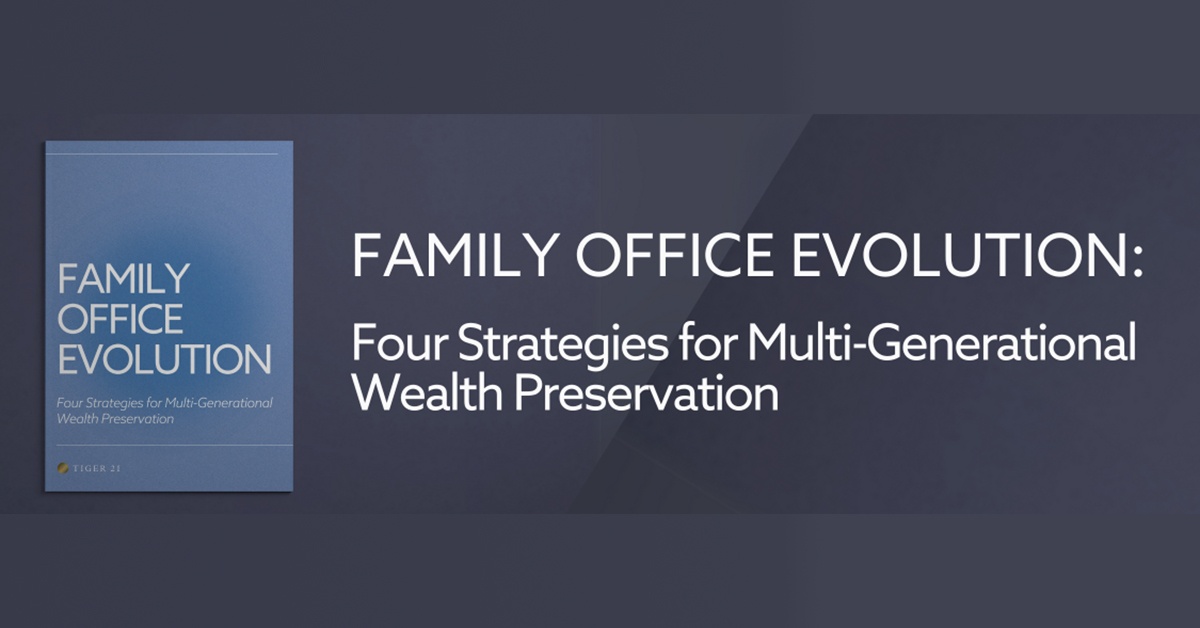The Cost of Poor Governance in Family Businesses

Governance Matters: A Blog Series by Chris Rose, TIGER 21 Family Office Chair
The $50M Fight That a $25K Family Governance Budget Could Have Prevented
The brothers were both in their 40s when their father died. There was no family charter, no formal board, and no clear succession plan—just a vague understanding that “they’d figure it out.”
They didn’t.
What started as a disagreement over distributions spiraled into an eight-figure legal dispute. Lawyers were hired. The family’s operating company was frozen. By the time a settlement was reached, more than $50 million had been lost—through legal fees, forced sales, and fractured partnerships. But the most lasting damage was to trust, cohesion, and the next generation’s opportunity to lead together.
This kind of breakdown isn’t rare in family businesses. It’s just rarely discussed. And the most frustrating part? Much of it could have been avoided—with a modest investment in governance.
The Cost of Neglecting Governance in Family Businesses
Most family businesses budget for legal, tax, and investment advice. But governance—how families make decisions, resolve differences, and stay aligned—is often overlooked. It’s dismissed as soft, symbolic, or premature. Yet when it fails, the consequences are anything but.
Founders often assume harmony will last. Others avoid raising governance out of fear it will spark conflict. But clarity prevents confusion. Process reduces pressure. Structured communication is always better than silence.
Without a governance strategy, even families that start with unity and goodwill can find themselves drifting into dysfunction. It doesn’t take a major betrayal—just years of avoidance, mismatched expectations, and slow erosion of alignment.
A Contrast Case: When Family Governance Works
Another family business, with similar wealth and complexity, took a different path. Five years before stepping back, the founder began holding quarterly strategy sessions with his two daughters and their spouses. With support from a family governance advisor, they defined shared goals, clarified roles, and worked through disagreements. The daughters joined the business’s oversight committee—first as observers, then as contributors. When the founder retired, the transition was seamless.
The cost? About $60,000 over four years. The benefit? A united family, a growing enterprise, and a clear path forward. They didn’t just avoid conflict—they invested in continuity. That investment didn’t just preserve their relationships. It allowed the business to operate with clarity and consistency through a leadership transition that might otherwise have caused disruption.
The Unseen Risk on the Balance Sheet
Every family business experiences change: generational shifts, geographic dispersion, evolving values, increasing complexity. A family governance structure is what allows families to absorb that change without falling apart.
Without it, small misunderstandings compound. What appears to be a sudden rupture is usually years in the making—rooted in unresolved expectations, unclear roles, and a lack of structure.
This isn’t just a relational risk. It’s a strategic one. Poor governance slows decision-making, drives away talent, and undermines credibility. In a family business, trust is as critical as capital. Lose one, and you often lose the other.
And unlike investment losses, these failures are rarely visible. There’s no balance sheet entry for reputational drift or missed opportunities due to family friction.
Why Litigation Is Just the Beginning
When family governance fails, the financial impact rarely stops with legal fees. Consequences often include:
- Missed or stalled business decisions
- Departures of key staff amid uncertainty
- Damaged partner and advisor relationships
- Forced asset sales under pressure
- Fragmented ownership and inefficient tax structures
These outcomes aren’t caused by conflict alone—but by the absence of a family governance framework to address it constructively. The trigger might be emotional, but the result is financial.
What Prevention Looks Like
Avoiding these pitfalls doesn’t require overbuilding. A modest, well-structured governance budget might include:
- Annual strategy sessions with a governance advisor ($25,000)
- Facilitated family meetings ($10,000–$20,000)
- A family charter or decision-making framework ($5,000–$15,000)
- Next-generation education and leadership development ($15,000–$30,000)
- A succession or transition roadmap with expert guidance ($20,000–$50,000)
These investments are often less than what families pay for a single basis point in management fees. More importantly, they protect the foundation that those financial strategies rest on.
And while some families hesitate to begin, early investments in governance are often the most cost-effective. They prevent small cracks from becoming structural failures.
Different Stages, Different Need
Governance isn’t one-size-fits-all. The needs of a family business vary depending on where it is in its evolution. Here are three common profiles—each with different pain points and priorities:
1. The Founder-Led Business
Still tightly controlled by the first generation, with limited formal structure. Decisions are efficient—but fragile. Without documentation or planning, transitions can be destabilizing. Early governance steps might include drafting a values statement, introducing a board of advisors, or creating space for the next generation to observe strategic discussions.
2. The Expanding Family
The wealth creator is still active, but multiple immediate family units are now involved. Sons and daughters—along with their spouses—begin playing more prominent roles. Differences emerge in priorities, communication styles, or investment approaches. This is the time for structured family meetings, a working charter, and shared protocols around capital allocation and decision rights.
3. The Multi-Generational Enterprise
The family business or office has grown larger than any one individual. By this stage, the next generation’s children—cousins with diverging interests and degrees of involvement—may now be stakeholders. The enterprise may include direct investments, philanthropy, or a shared operating business. Governance evolves into infrastructure: clearly defined committees, generational transition plans, and systems for resolving conflict across branches and stakeholders.
Each of these families needs governance—not to constrain—but to enable. The earlier they invest in it, the more adaptable they become.

Family Governance as a Competitive Advantage
Good governance does more than prevent failure. It creates alignment and momentum. Families with strong governance are able to:
- Act quickly on business opportunities
- Retain and attract talent—inside and outside the family
- Build trust with co-investors, advisors, and partners
- Launch complex, long-horizon initiatives with clarity and confidence
These families don’t just preserve wealth. They amplify it—because they operate with shared purpose, not constant negotiation.
And in competitive markets, that alignment becomes a strategic edge. Speed, trust, and cohesion are differentiators that governance enables.˛
Family Governance Myths That Cost Millions
Several myths continue to hold families back:
- “We don’t need it—our family gets along.” Most families do, until something changes. Governance prevents disagreements from turning into divisions.
- “It’s too early.” Governance doesn’t require a full constitution. It can start with one facilitated conversation.
- “It’s too soft.” Governance shapes business decisions, reputation, and succession. It’s not peripheral—it’s structural.
These assumptions don’t protect families. They expose them.
Five Governance Questions for Every Family Business
If your family business hasn’t formalized a governance plan, ask yourself:
- Who makes key decisions—and how are they selected?
- What happens when branches of the family disagree?
- Is the next generation prepared—and empowered—to contribute?
- Are we aligned on long-term priorities—or just assuming we are?
- What would happen if a key family member passed away tomorrow?
If you don’t like your answers, now is the time to act—and to budget for governance with the same discipline you bring to legal, tax, and financial planning.
Positioning Governance as a Strategic Foundation
Governance is often introduced too late—after decisions stall, roles blur, or tensions surface. But the most resilient families treat it as core infrastructure: a system for aligning priorities, resolving tensions, and adapting to change.
It isn’t about control. It’s about creating the conditions for clarity, continuity, and trust—especially as complexity grows. Good governance lets families make difficult decisions without undermining relationships or momentum.
Its value doesn’t lie in rituals or paperwork, but in results: faster execution, fewer distractions, and a more confident hand on the wheel.
Families that treat governance as strategy don’t just avoid risk. They position themselves to grow—together, and on purpose.
At TIGER 21, our Family Office Groups provide a trusted forum where ultra-high-net-worth individuals (UHNWIs) can navigate the intricate challenges of governance, succession planning, and NextGen engagement. By sharing insights and experiences with peers who have faced similar challenges, Members gain invaluable perspectives to shape governance strategies that stand the test of time.
Learn more about TIGER 21 Membership and how our Family Office Groups can help you future-proof your governance strategy.
About Governance Matters
In this exclusive blog series, TIGER 21 Chair Chris Rose delves into the key pillars of governance that define enduring family offices. From structuring leadership and decision-making to balancing legacy and innovation, Chris shares real-world insights and best practices drawn from years of experience guiding ultra-high-net-worth families.
Stay tuned as we explore the strategies that help family offices thrive in an ever-evolving landscape.
About Chris Rose
Chris Rose is a partner at Dentons, the world’s largest law firm, where he serves on the Global Steering Committee of the Family Office and High Net Worth Group. He has extensive experience advising ultra-high-net-worth families on governance, cross-border investments, and family office strategies. Previously, he led Dentons’ Venture Technology practice in Europe and has advised on over 300 venture and growth capital transactions. A long-standing YPO member, Chris previously ran the YPO Deal Network, facilitating billions in transactions.
About TIGER 21
TIGER 21 is an exclusive global community of ultra-high-net-worth entrepreneurs, investors, and executives.
Explore the TIGER 21 Member ExperienceMember Insight Reports










